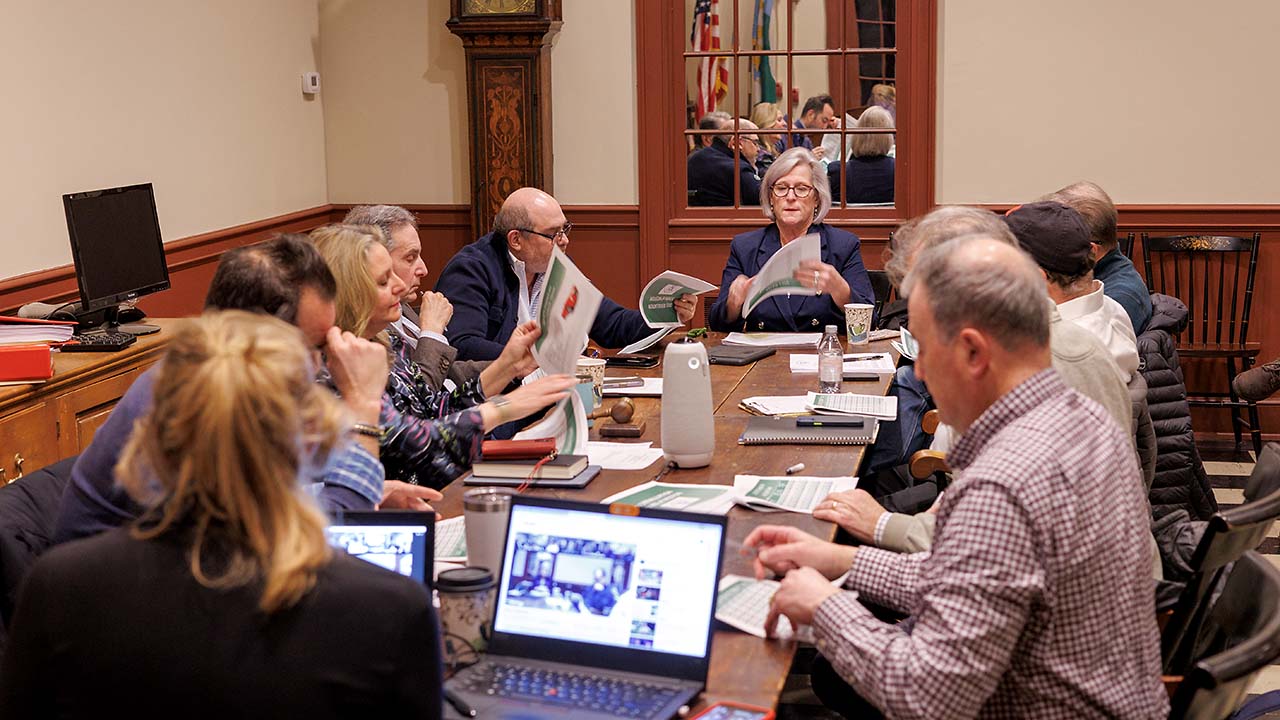Grand List Soars, Mill Rate to Fall

Assessor Denise Hames presents. Weston Today photo
In the five years since the last townwide property revaluation, the value of Weston real estate has skyrocketed, producing net Grand List growth of 38.4 percent, driven by an aggregate 42.3 percent rise in real property values.
The lower net is due to a decrease in the value of motor vehicles, a return to earth after last year’s unusual spike of valuations due to the supply chain crunch. This year, the motor vehicle portion of the Grand List shrank by 5.1 percent.
The Grand List is the town’s tax base. It includes all real property, motor vehicles, and personal property used for business purposes.
A higher Grand List produces a lower mill rate, but it is too soon to tell what the new mill rate will be and how it will translate to actual property tax bills. The rate is not officially set until early May, once budgets are approved.
An early estimate
Nevertheless, on February 15 Assessor Denise Hames put a stake in the ground, painting a pro forma picture for the Selectmen and Board of Finance.
The calculations made by Ms. Hames and Finance Director Rick Darling were adjusted a bit in the last two weeks, after the proposed Town operating budget was presented and the Board of Education’s capital requests were revised.
Based on Grand List data and the budget proposals as they stand — not yet taken up by the Board of Finance — the mill rate would drop from its current 33.06 per thousand of assessed value to 24.28 per thousand, down 26.6 percent.
That probably won’t be the final number, and it doesn’t necessarily translate to lower taxes, because the proposed budgets call for increased spending to meet rising costs and a significant investment in capital improvements.
Tax impact
At the moment, the operating budgets proposed for the schools and the Town add up to an increase of $2.3 million, up more than 3 percent. And proposed capital expenditures rise by about $1 million over last year’s level.
But there is a huge offset. Bonds issued 20 years ago are almost completely paid off. This year, roughly $2 million is shaved off debt service obligations. As a result, actual total spending rises about 1½ percent, as proposed.
Still, as it stands — midway through the budget cycle — a mill rate dropping to 24.28 would produce a higher property tax bill at every level of the home market, but there is an offset to that too.
For example, take a house appraised in 2018 at $720,000 (market value). Today, if it appreciated by the average 43.75 percent, it is worth $1.035 million. So, at the lower 24.28 mill rate, its property tax would rise by about 5½ percent.
Some of that increase could abate by lower taxes on lower-valued motor vehicles.
According to the assessor, the value of the average vehicle declined by about 3.2 percent this year. The tax on that vehicle, assessed at $17,560, would be about $426, which is $163 lower (28 percent) than last year.
As proposed …
The Board of Education’s budget request was formally adopted on January 23. Its proposed 2.85 percent operating increase has not changed since then, except for a vote a few weeks later to ask if the Town would be interested in funding 60 percent of the cost of hiring a second “Mile of Safety” police officer to patrol the campus. Interest at Town Hall and on the Police Commission appears to be wan.
The Board also voted revisions to its capital request, reordering some priorities, adding an item for engineering assistance on planning school renovations, and finally getting an estimate for a previous TBD item: $300,000 to replace the high school water heating system. All in, the total ticked up just over $120,000 to $1,526,500.
The Town’s budget proposal, characterized by the First Selectwoman as a “catch up” on long-deferred staffing needs and overdue facility repair and replacements, was transmitted to the Board of Finance on February 26.
That proposal calls for a roughly 4.5 percent increase for operations, an amount about on par with recent years. The hike is driven in part by contractual wage increases and adding positions: a Human Resources Director and a facilities manager. Funds, but not headcount, were also set aside to get a head start on hiring a police officer if an anticipated mini-wave of retirements from the force materializes.
The Town's capital budget request comes to nearly $3.3 million. Big ticket items include the remaining half ($554,000) needed to replace the aging Fire Engine No. 7. (The first half was allocated in a special appropriation on January 30.) Another $606,000 is proposed to replace the Annex, the aged modular unit that houses some Town staff.
The Board of Finance begins its review of budgets on March 6 and holds a public hearing on April 2. The Annual Town Budget Meeting (ATBM) is scheduled for April 24 at the Weston High School auditorium.
